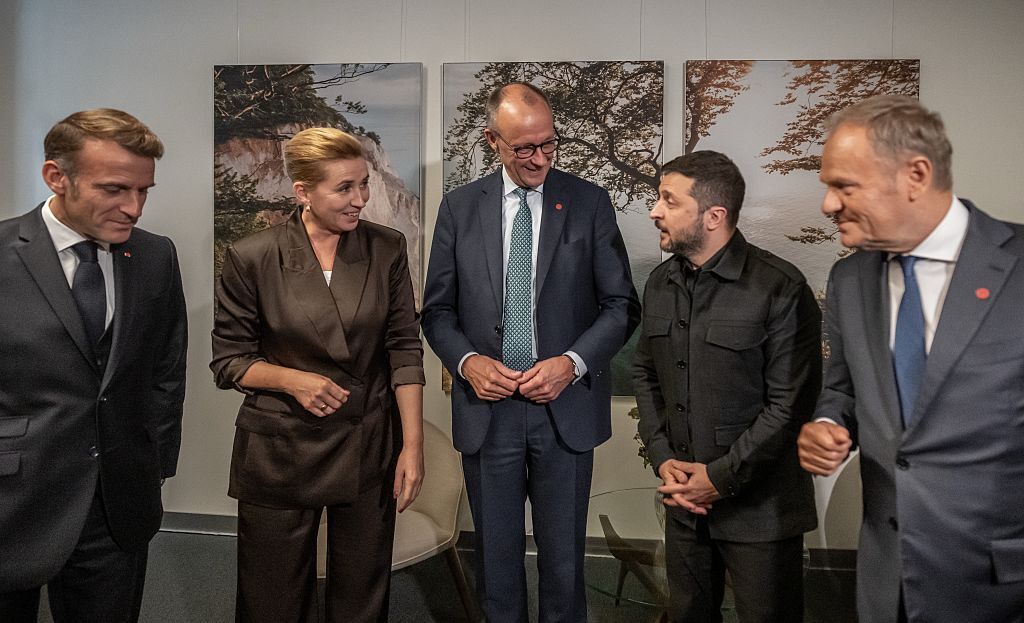Today’s edition is powered by the Party of European Socialists (PES)
PES Congress 2025: Progressive Mobilisation.
Not politics-as-usual, but a large conference uniting prime ministers, mayors, politicians, journalists, activists, artists, academics, trade unionists, and entrepreneurs from across Europe and beyond to tackle Europe’s big questions – and turn ideas into action. 16–18 October 2025, Amsterdam.
This week, the action was transplanted from Brussels to Copenhagen, where European leaders enjoyed Danish hospitality at the European Political Community. The meeting was widely billed as “informal”, although it featured a royal banquet on Wednesday, and plenty of hard talk – particularly on issues of defence and the Commission’s proposal for a “reparations loan” for Ukraine.
Despite drone sightings around Danish airports and a military base – described by ministers as part of a “hybrid attack” designed to “spread fear” – the dignitaries were able to convene to discuss plans to protect European airspace from intruders. Central to this was a “drone wall”, which would draw on Ukrainian expertise in this technology to create a shared defence system.
Drones have triggered emergency responses and airport closures recently in Germany, Norway, and Belgium, making it a priority for EU and NATO members. However, whilst von der Leyen announced on Tuesday that “€2 billion will be spent on drones now”, leaders of Europe’s four largest economies were lukewarm about the proposed “drone wall”, voicing various concerns with the idea. Meanwhile, players in the defence industry warned that a lack of alignment among allies presents yet another vulnerability.
To confiscate or not to confiscate?
How to fund Ukraine’s war effort against Russia is another issue that has divided EU leaders. A framework to use frozen Russian assets has brought sensitivities to the fore. Commission reassurances of the legal basis to mobilise Moscow’s assets have failed to get Belgium on board – which is crucial as the funds are held in a clearing house in Brussels.
The plan could secure some €140 billion for the beleaguered nation but Belgium’s prime minister has remained sceptical, expressing fears it would put his country at a heightened risk of Russian retaliation, which Putin has promised should the EU proceed.
A decision will likely be made at the next European Council summit in three weeks.
Thai tuna agitates Europe’s fishers
Discussions of a free trade deal between the EU and Thailand has sparked fears that Thai tuna exports will flood the market, decimating Europe’s industry in the process.
Thailand is the world leader in preserved tuna, and EU consumers have a strong appetite for the product, eating more tuna than any other fish. “Export potential to the EU market is very big,” a representative of the EU sector acknowledged.
But environmental agencies have highlighted issues with the Thai industry, including human rights abuses on fishing vessels and illegal fishing practices.
More stringent online protection for minors
During its term at the helm of the Council of the EU, Denmark has made online safety a priority and has pushed for more robust protections of minors online. In particular, this should be coordinated at the EU level and the bloc should make sure it isn’t left to social media platforms “to decide the age limits.”
Ursula von der Leyen has also supported stronger social media restrictions, warning that a pervasive “tsunami of Big Tech” poses a threat to children, who must be better guarded from bullying, pornographic and self-harm content that circulates online.
What caused the Iberian blackout?
An expert panel concluded that the major power outage that caused chaos on the Iberian peninsula in April was without precedent, triggered by fluctuations in the frequency of the AC current and a spike in voltage.
“We have never had a blackout due to over-voltage; this is new to us,” said the investigation’s joint leader. Others note that the incident highlights the need for grid upgrades and a focus on clean flexibility. But it is unlikely that responsability for the failure – which led to the deaths of at least seven people – will be attributed to any single actor.
